#Franz Grillparzer
Text
Wer seine Schranken kennt, der ist der Freie. Wer frei sich wähnt, ist seines Wahnes Knecht.
Anyone who knows their limits is free. Anyone who thinks they are free is the slave of their delusion.
Franz Grillparzer (1791 – 1872), Austrian writer and dramatist
20 notes
·
View notes
Text

Franz Grillparzer:

#lol#lmao#napoleonic shitpost#Franz Grillparzer#napoleon#napoleonic era#napoleonic#napoleon bonaparte#grillparzer
13 notes
·
View notes
Text
Se il mio tempo mi vuole avversare, io lo lascio fare tranquillamente: io vengo da altri tempi e in altri spero di andare.
Franz Grillparzer
3 notes
·
View notes
Text


*I can't edit polls, his name should have one more e and be Wellesley
Arthur Wellesley, Duke of Wellington
[no propaganda submitted]
Franz Grillparzer
[no propaganda submitted]
47 notes
·
View notes
Text
"Reason and the ability to use it are two separate skills."
- Franz Grillparzer
5 notes
·
View notes
Text

"It is the mind that makes man free or a slave.”
—Franz Grillparzer
19 notes
·
View notes
Text
Jealousy is a passion, seeking zealously what causes suffering.
Translation of a quote by austrian writer Franz Grillparzer.
2 notes
·
View notes
Text
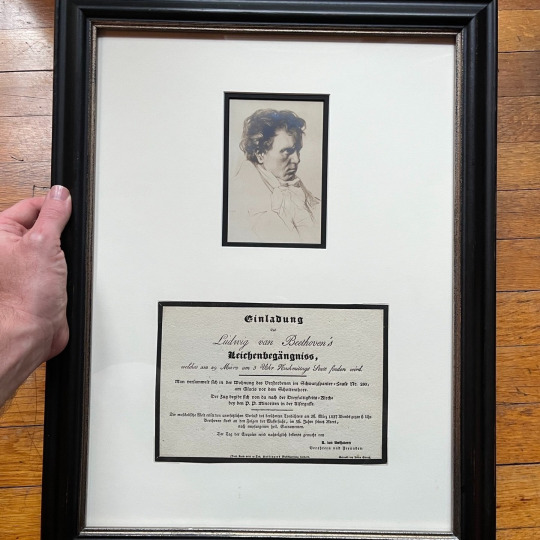
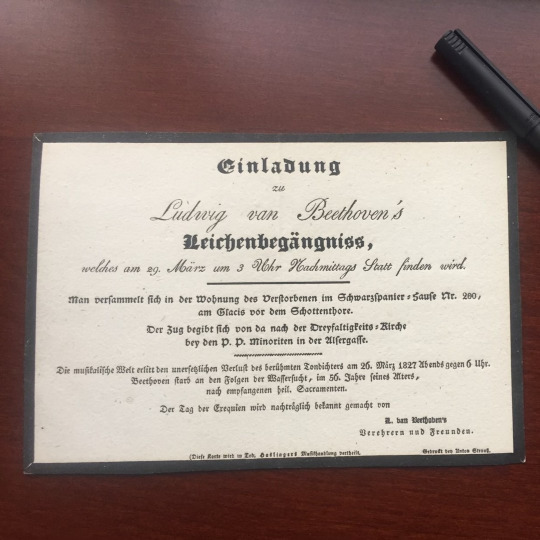
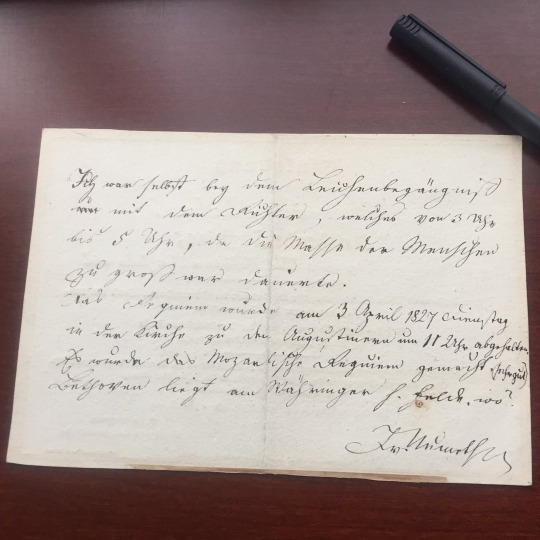
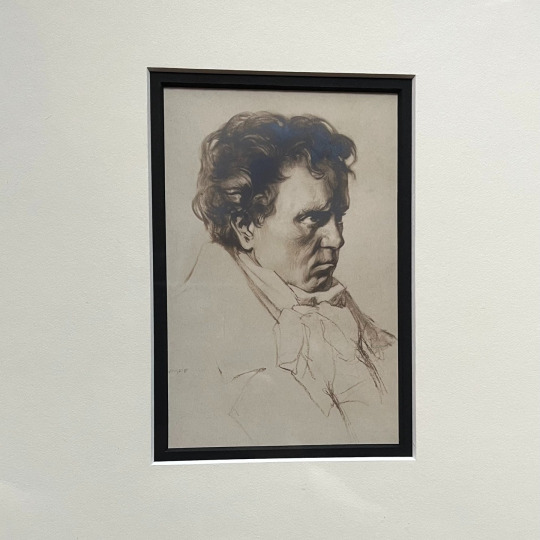
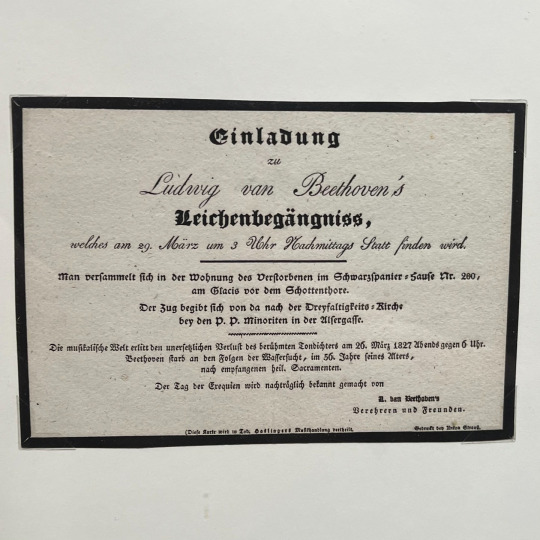
OTD in Music History: Ludwig van Beethoven (1770 - 1827) is laid to rest in Wahring Cemetery in Vienna.
(Beethoven's remains would later be exhumed for scientific study in 1863, and then exhumed a second time and relocated to Vienna's Zentralfriedhof Cementary in 1888. He now lies in a grave adjacent to Franz Schubert's [1797 - 1828] final resting place.)
Beethoven's funeral procession was attended by an estimated 10,000 people -- the largest public mourning turnout in Vienna's history up until that point. Schubert served as one the official torchbearers, and a funeral oration was written and delivered by noted poet Franz Grillparzer (1791 - 1872). Music composed by both Beethoven and his highly-esteemed contemporary, Luigi Cherubini (1760 - 1842), was performed.
Grillparzer's oration can be read here: http://www.lvbeethoven.com/Bio/BiographyFuneralOration.html
PICTURED: An original printed invitation to attend Beethoven's funeral, featuring text that was written by one of Beethoven's closest friends, Stephan von Breuning. It reads:
"Invitation to the funeral
of Ludwig van Beethoven,
which will be held on March 29 at 3 pm.
We will meet at the home of the deceased in Schwarzspanierhaus, 200, on the Glacis,
opposite the Schottentor.
The procession will move from here to the Dreifaltigkeitskirche [Trinity Church]
at the Fr. P. Friars Minorite in the Alsergasse. [via Alser]
The musical world suffered the irreparable loss of the famous composer on March 26, 1827 around 6 pm. Beethoven passed away in his fifty-sixth year of age, from dropsy, after receiving the holy sacraments.
The day of the suffrage mass will be announced later
by the admirers and friends of Ludwig van Beethoven.
(This ticket is distributed in Tobias Haslinger's music store.)
Printed by Anton Strauss."
A mourner who actually witnessed the funeral has handwritten a contemporaneous account of what he saw on the back of this particular copy of the invitation.
#Ludwig van Beethoven#Beethoven#composer#classical composer#pianist#classical pianist#piano#classical music#music history#Symphony#Eroica#Concerto#Cadenza#Chamber music#music#Sonata#Moonlight Sonata#Für Elise#Fidelio#opera#bel canto#aria#diva#maestro#prima donna#chest voice#Cantata#classical musician#classical musicians#classical studies
4 notes
·
View notes
Text
Suche selbst deine Fehler zu erkennen; denn die Wohlwollenden machen dich nicht darauf aufmerksam, um dir nicht wehe zu tun, die Feindseligen nicht, weil sie sich über diese Fehler freuen.
Try to recognize your own mistakes; for the benevolent do not tell you so as not to hurt you, the hostile don't because they rejoice in these mistakes.
Franz Grillparzer (1791 – 1872), Austrian writer
33 notes
·
View notes
Text
German and Austrian contemporaries of Napoleon (plus one by Émile Zola in his essay about Stendhal, a French contemporary):
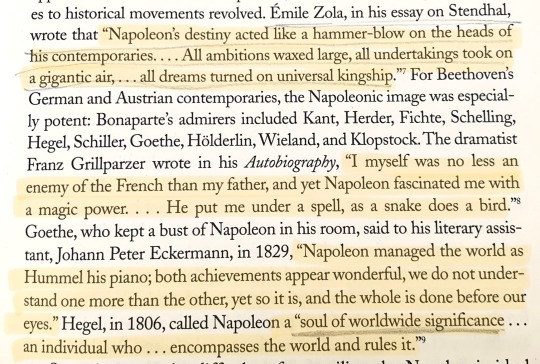
Source: Beethoven, by Maynard Solomon
#napoleon#quotes#book#book pic#napoleonic era#napoleonic#first french empire#french empire#napoleon bonaparte#Kant#herder#Fichte#schelling#Hegel#Schiller#Goethe#friedrich hölderlin#hölderlin#wieland#klopstock#grillparzer#franz grillparzer#émile zola#Zola#Stendhal#Beethoven#france#history#frev#writers and Napoleon
20 notes
·
View notes
Text
Old Vienna
Der Gundelhof
(1, Bauernmarkt 4, Brandstätte 5)

Der Gundelhof wurde nach der angesehenen Tiroler Familie der Gundlach (verballhornt in Gundel) benannt, welche 1495 in den Besitz des Hofs kam.
Zum ersten Mal wird hier 1351 ein Haus erwähnt, das dem Bürgermeister Berthold Poll gehörte und in dem sich eine dem heiligen Thomas geweihte Kapelle befand. 1422 wurde es mitsamt der Kapelle vom Stadtanwalt Hans Zink verkauft, wobei hier vom Haus, "das weilent drei Häuser gewesen sind", die Rede ist. In den Jahren 1434 bis 1461 gehörte es Peter (Lorenz?) Strasser. Die häufige Annahme, dass die Thomaskapelle erst von ihm errichtet worden sei, ist falsch, da sie bereits 1343 erwähnt wird. Es ist aber möglich, dass die Kapelle um 1450 erneuert wurde.
1607 erwarb der Bürgermeister Augustin Haffner den Gundelhof, ließ die bereits verfallene Thomaskapelle wiederherstellen und gründete eine Messstiftung. Danach wurden hier wieder heilige Messen gelesen. Über seine Gattin Barbara kam 1617 der Bürgermeister Paul Wiedemann in den Besitz des Hauses. Er ließ die Ausstattung der Kapelle erweitern und vergrößerte die Messstiftung. Am 16. Juli 1696 kaufte Bartholomäus Tinti den Hof, dessen in den Freiherrenstand erhobene Familie ihn über 100 Jahre lang besaß.
1800 hatte Erzherzog Ferdinand d'Este, der Bruder Kaiser Josephs II., den Gundelhof erworben und vererbte ihn seinem Sohn, Erzherog Franz, Freiherr von Modena. Am 20. April 1810 verkaufte dieser den Gundelhof an den Juwelier Bruno Neuling, der ihn seinem Sohn Vinzenz vererbte. Salomon Mayer Rothschild wurde am 31. August 1843 Besitzer des Hauses. Noch ein Jahr vor seinem Tod im Jahr 1855 ließ er einen Zubau errichten.
1802 wurde die erste Wiener Börse vom Haus "Zum grünen Fassel" (1, Kohlmarkt 8-10) vorübergehend hierher verlegt.
Im Vormärz befand sich hier der bekannte Sonnleithnersche Salon, der größte musikalische Salon seiner Zeit, der vor allem von Franz Schubert und seinem Freundeskreis, aber auch von Franz Grillparzer und Karoline Pichler besucht wurde.
Hier wurde bis zur Demolierung der Häuser der Gänsemarkt abgehalten (ursprünglich stand auch der Gänsemädchenbrunnen hier).Im Hof des Gebäudes standen Verkaufsbuden. Der Gundelhof schloss die Brandstätte zum Bauernmarkt hin ab, sodass diese nur durch den Hof oder durch zwei Schwibbogen vom Stephansfreithof aus betreten werden konnte.
Der Komplex beherbergte auch zwei bekannte Gasthäuser, den "Goldenen Stern" und die "Eiche" (in welcher Beethoven oft anzutreffen war).
1877 ließ die Stadtbaugesellschaft den Gundelhof, den sie 1873 erworben hatte, demolieren und durch ein modernes Miethaus ersetzen, das im April 1945 ausbrannte und 1949 neu aufgebaut wurde.


1 note
·
View note
Text
1 note
·
View note
Text
Friends, enemies, comrades, Jacobins, Monarchist, Bonapartists, gather round. We have an important announcement:
The continent is beset with war. A tenacious general from Corsica has ignited conflict from Madrid to Moscow and made ancient dynasties tremble. Depending on your particular political leanings, this is either the triumph of a great man out of the chaos of The Terror, a betrayal of the values of the French Revolution, or the rule of the greatest upstart tyrant since Caesar.
But, our grand tournament is here to ask the most important question: Now that the flower of European nobility is arrayed on the battlefield in the sexiest uniforms that European history has yet produced (or indeed, may ever produce), who is the most fuckable?
The bracket is here: full bracket and just quadrant I
Want to nominate someone from the Western Hemisphere who was involved in the ever so sexy dismantling of the Spanish empire? (or the Portuguese or French American colonies as well) You can do it here
The People have created this list of nominees:
France:
Jean Lannes
Josephine de Beauharnais
Thérésa Tallien
Jean-Andoche Junot
Joseph Fouché
Charles Maurice de Talleyrand
Joachim Murat
Michel Ney
Jean-Baptiste Bernadotte (Charles XIV of Sweden)
Louis-Francois Lejeune
Pierre Jacques Étienne Cambrinne
Napoleon I
Marshal Louis-Gabriel Suchet
Jacques de Trobriand
Jean de dieu soult.
François-Étienne-Christophe Kellermann
17.Louis Davout
Pauline Bonaparte, Duchess of Guastalla
Eugène de Beauharnais
Jean-Baptiste Bessières
Antoine-Jean Gros
Jérôme Bonaparte
Andrea Masséna
Antoine Charles Louis de Lasalle
Germaine de Staël
Thomas-Alexandre Dumas
René de Traviere (The Purple Mask)
Claude Victor Perrin
Laurent de Gouvion Saint-Cyr
François Joseph Lefebvre
Major Andre Cotard (Hornblower Series)
Edouard Mortier
Hippolyte Charles
Nicolas Charles Oudinot
Emmanuel de Grouchy
Pierre-Charles Villeneuve
Géraud Duroc
Georges Pontmercy (Les Mis)
Auguste Frédéric Louis Viesse de Marmont
Juliette Récamier
Bon-Adrien Jeannot de Moncey
Louis-Alexandre Berthier
Étienne Jacques-Joseph-Alexandre Macdonald
Jean-Mathieu-Philibert Sérurier
Catherine Dominique de Pérignon
Guillaume Marie-Anne Brune
Jean-Baptiste Jourdan
Charles-Pierre Augereau
Auguste François-Marie de Colbert-Chabanais
England:
Richard Sharpe (The Sharpe Series)
Tom Pullings (Master and Commander)
Arthur Wellesley, 1st Duke of Wellington
Jonathan Strange (Jonathan Strange & Mr. Norrell)
Captain Jack Aubrey (Aubrey/Maturin books)
Horatio Hornblower (the Hornblower Books)
William Laurence (The Temeraire Series)
Henry Paget, 1st Marquess of Anglesey
Beau Brummell
Emma, Lady Hamilton
Benjamin Bathurst
Horatio Nelson
Admiral Edward Pellew
Sir Philip Bowes Vere Broke
Sidney Smith
Percy Smythe, 6th Viscount Strangford
George IV
Capt. Anthony Trumbull (The Pride and the Passion)
Barbara Childe (An Infamous Army)
Doctor Maturin (Aubrey/Maturin books)
William Pitt the Younger
Robert Stewart, 2nd Marquess of Londonderry (Lord Castlereagh)
George Canning
Scotland:
Thomas Cochrane
Colquhoun Grant
Ireland:
Arthur O'Connor
Thomas Russell
Robert Emmet
Austria:
Klemens von Metternich
Friedrich Bianchi, Duke of Casalanza
Franz I/II
Archduke Karl
Marie Louise
Franz Grillparzer
Wilhelmine von Biron
Poland:
Wincenty Krasiński
Józef Antoni Poniatowski
Józef Zajączek
Maria Walewska
Władysław Franciszek Jabłonowski
Adam Jerzy Czartoryski
Antoni Amilkar Kosiński
Zofia Czartoryska-Zamoyska
Stanislaw Kurcyusz
Russia:
Alexander I Pavlovich
Alexander Andreevich Durov
Prince Andrei (War and Peace)
Pyotr Bagration
Mikhail Miloradovich
Levin August von Bennigsen
Pavel Stroganov
Empress Elizabeth Alexeievna
Karl Wilhelm von Toll
Dmitri Kuruta
Alexander Alexeevich Tuchkov
Barclay de Tolly
Fyodor Grigorevich Gogel
Ekaterina Pavlovna Bagration
Ippolit Kuragin (War and Peace)
Prussia:
Louise von Mecklenburg-Strelitz
Gebard von Blücher
Carl von Clausewitz
Frederick William III
Gerhard von Scharnhorst
Louis Ferdinand of Prussia
Friederike of Mecklenburg-Strelitz
Alexander von Humboldt
Dorothea von Biron
The Netherlands:
Ida St Elme
Wiliam, Prince of Orange
The Papal States:
Pius VII
Portugal:
João Severiano Maciel da Costa
Spain:
Juan Martín Díez
José de Palafox
Inês Bilbatua (Goya's Ghosts)
Haiti:
Alexandre Pétion
Sardinia:
Vittorio Emanuele I
Lombardy:
Alessandro Manzoni
Denmark:
Frederik VI
Sweden:
Gustav IV Adolph
57 notes
·
View notes
Text
Devocional diário
Vislumbres da Eternidade
Reconheça e confie
Então o homem disse: “A mulher que me deste para estar comigo, ela me deu da árvore, e eu comi.” Gênesis 3:12
O relato de Adão em Gênesis 3 é tristemente parecido com nossa realidade. Não é só porque ali estão descritos quais seriam os efeitos do pecado neste mundo, mas porque Adão tem uma reação muito peculiar: ele coloca a culpa da sua conduta nos outros. Se lermos detalhadamente a justificativa, ficamos com a impressão de que ele transfere a culpa do que ocorreu para o próprio Deus. A técnica de Adão era “transferir e ignorar”.
Essa é uma reação frequente nas pessoas que fizeram algo errado e não se sentem verdadeiramente arrependidas. Dar desculpas ou culpar os outros, além de infantil e covarde, é também uma atitude que não ajuda a resolver o problema. Por quê? Porque, ao transferir a culpa, não se consegue reconhecer onde está o problema nem como enfrentá-lo. Imagine que seu pé esteja doendo muito, mas que toda hora você insiste que o problema está no seu tipo de penteado. Por mais que você vá ao salão para dar formas diferentes ao seu cabelo ou para cortá-lo, a dor do seu pé não vai desaparecer. Franz Grillparzer, um dramaturgo austríaco, afirmou acertadamente: “Existe um remédio para as culpas: reconhecê-las.”
Reconhecer nosso erro é um passo imprescindível para alcançar a solução. Não somente nos recoloca no caminho da verdade, como também nos tira da infância espiritual, aquela em que se vive na fantasia e na cegueira. Depois de reconhecer a culpa, não fique com ela. Passe-a para Jesus. Como diz 1ª João 1:9, “se confessarmos os nossos pecados, Ele é fiel e justo para nos perdoar os pecados e nos purificar de toda injustiça”. A técnica de Jesus é “reconhecer e confiar”. Reconhecer a culpa e confiar sua vida ao Senhor.
Faça a você mesmo as seguintes perguntas: Faço algo de errado? Jogo a culpa nos outros? Que culpa me atrevo a reconhecer? Sigo a técnica de Adão ou a de Jesus? Pergunte-se essas coisas com as palavras de 1 João 4:10 ao fundo: “Nisto consiste o amor: não em que nós tenhamos amado a Deus, mas em que Ele nos amou e enviou o Seu Filho como propiciação pelos nossos pecados.” Deus continuará amando-o, não importa o que você fizer. Você já sabe: reconheça, confie e, com a ajuda de Cristo, mude!
1 note
·
View note
Quote
I'd wish the government took honest people into consideration, it shows enough consideration for scoundrels.
Franz Grillparzer
16 notes
·
View notes
Text
I'm using images off the internet because my own photos where terrible (couldn't get close enough because there was a fence), but when I was in Vienna at the start of the month I stumbled upon this Sappho carving as part of a larger monument to Austrian writer Franz Grillparzer. The reliefs were done by Rudolf Weyr.


Besides being overjoyed at accidentally discovering this because I had no idea it was there, I just love it to bits. The way Sappho and the other woman are posed is doing things to me. And the dude in the back on his knees is extremely funny. Give up bro she's not coming back. In isolation, it paints a very fun picture of Sappho being an absolute stud who gets all the ladies which I am here for.
Well, okay, here's one of my own pictures. I had my binoculars because I was birding so this is taken through those with my shitty iPhone camera.

0 notes